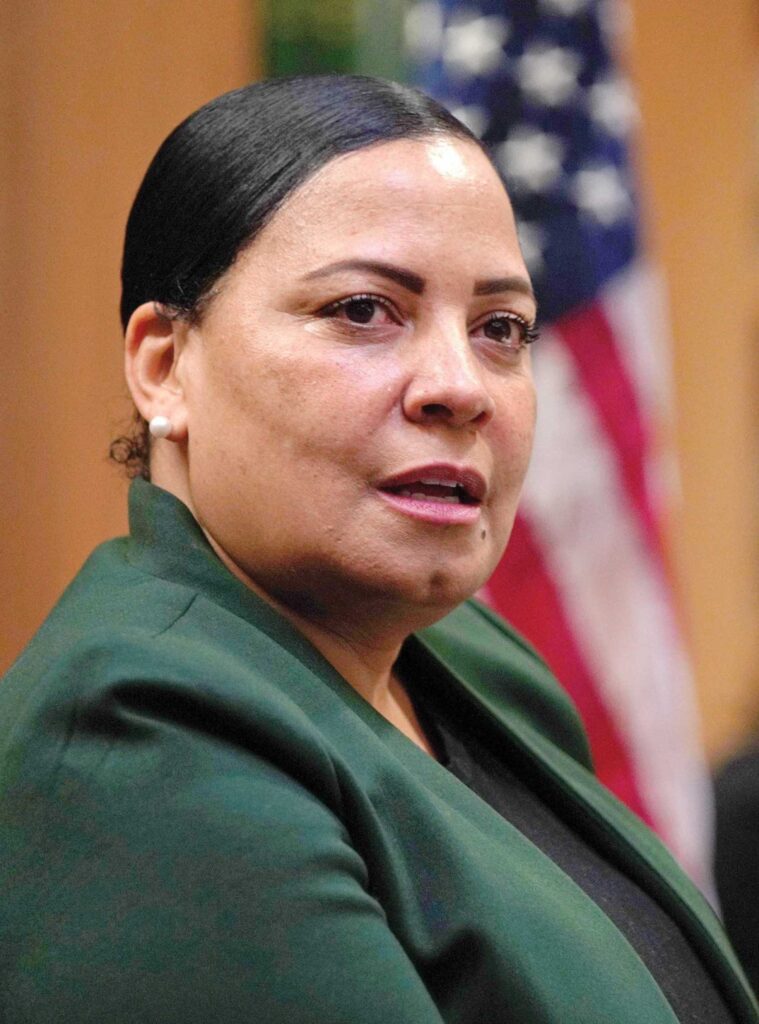Rachael Rollins resigns over ethics investigations
Local leaders applaud her commitment to justice reform

Supporters of Rachael Rollins lamented her resignation as U.S. attorney for Massachusetts as the departure of an unapologetic advocate for reforming the criminal justice system.
After 13 months as the first Black woman to hold the position, Rollins resigned May 19, following the release of two federal reports on a series of ethical breaches. The most serious appeared to be her back-channel support of the candidacy of Boston City Councilor Ricardo Arroyo to succeed her as district attorney for Suffolk County, the elected office she left to become U.S. attorney.
“For us, in Massachusetts, it’s a gut punch,” said former state Rep. Marie St. Fleur.
“We will move through it,” she added, “because we don’t have a choice.”
St. Fleur, who now owns a communications business, said Rollins’ zealous pursuit of criminal justice reform prompted political pushback, especially during her Senate confirmation, which passed by a single vote cast by Vice President Kamala Harris.
“As a Black person, as a Black woman, in this state, in this country, automatically — because you aren’t expected to be in these positions, you aren’t encouraged to be in these positions — any time you try to grow, you’re going to be under a certain level of scrutiny,” St. Fleur said.
Joyce Ferriabough Bolling, a political and media consultant, said of Rollins, “Let’s give credit where credit is due. She was making big strides that were part of a national movement. Here in Boston, what she said and what she did made a difference.”
As a candidate for district attorney, Rollins circulated a list of 15 offenses, such as nonviolent drug offenses, that her office would not prosecute. Once elected, she adopted that policy, despite criticism that she was giving impunity to criminals.
Ferriabough Bolling said she lamented the day Rollins was picked for the federal post, saying it amounted to moving from the frying pan into the fire.
Despite unanimous opposition from Senate Republicans, Rollins’ nomination was supported by leaders of Massachusetts law enforcement. A letter from Suffolk County police chiefs and State Police Colonel Christopher Mason emphasized mutual respect.
“She respects us and the work we do to keep our communities safe,” they wrote. “She can admit when she is wrong. She can also be incredibly persuasive when she is right.”
Juan Cofield, former chair of the New England Area Conference of the NAACP, has known Rollins since she was an assistant U.S. attorney from 2007 to 2011.
“She was at the leading edge of criminal justice reform,” Cofield said. He credits Rollins with advancing a public discussion about the system’s inequities over the last decade.
Cofield connected the urgency for criminal justice reform to over-policing of Black communities.
“We were the ones that were more harshly penalized. And that really emphasizes the lack of fairness in the system,” he said.
Cofield said he hopes Rollins’ legacy would contribute to “a ripple effect across the country” of smarter safety and justice spending.
“It’s just a waste of resources when prosecutors are pursuing minor offenses,” he said, arguing that instead of paying to prosecute crimes of poverty, the savings could provide young people with opportunities.
“I know that she had absolute confidence in her approach,” said Cofield, after citing racial disparities in incarceration.
For St. Fleur, who is a lawyer, Rollins’ role as a prosecutor distinguished her from legislative allies in the campaign for criminal justice reform.
“Anyone can write a policy. But the proof for a policy is in its execution and its implementation,” she said.
St. Fleur insisted that Rollins was a leader for a much larger movement.
“She’s the champion for the work and the sweat and the sacrifices of a lot of people who have been championing police reform and criminal justice reform for decades,” she said.
Worried about a retreat from reform, St. Fleur wondered about Rollins’ successor.
“I put this on the Biden administration,” she said. “Are you ready to give us not just an architect who is going to talk about policy, but give us that worker who is going to make it happen?” she asked.






